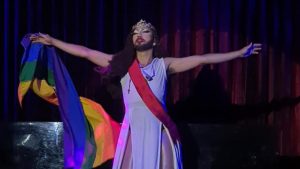On October 4, Philippine drag artist Pura Luka Vega was arrested over their performance as Jesus Christ singing a rock rendition of the Lord’s Prayer in July. The 33-year-old performer, whose real name is Amadeus Fernando Pagente, had shared a video of their performance in a now-deleted post on X, formerly known as Twitter.
The post went viral, prompting several Catholic groups across the country to lodge complaints against Pagente for “desecrating their religious faith and patron.” As the controversy surrounding Pagente grew, several clubs chose to cancel scheduled performances by the artist, with many cities making them “persona non grata,” including the capital Manila.
Over 90 percent of the Philippines identifies as Christian, with 80.6 percent affiliated with the Roman Catholic church. Conservative forces have long advocated for preserving strict Catholic family and moral values, resulting in the Philippines being often cited as the only country in the world where divorce remains illegal, aside from the Vatican City.
Pagente was arrested under Article 201 of the Philippine Revised Penal Code, which imposes imprisonment and a fine for “immoral doctrines, obscene publications and exhibitions, and indecent shows,” with paragraph 2(b) extending these punishments to performances deemed to “offend any race of religion.” Paolo Tamase, professor of law at the University of the Philippines, explains the controversial nature of the clause and why it has been contested by activists.
Article 201 in particular “is so broadly and vaguely worded that it can be used to suppress exhibits, shows, publications, and other forms of artistic and political expression for nebulous reasons,” Tamase said. He added that the use of the law in Pagente’s case is “particularly controversial because the State effectively protects religion from severe criticism.”
Tamase also situated the article in its historical context, tracing back to the Penal Code of 1870, at a time when the Philippines was still a colony of the Spanish Empire, “a time when there was no separation of Church and State and religious (and non-religious) freedom were not protected.”
Contemporary criticisms of this clause are therefore grounded in a belief that the law needs updating to reflect the changing minds and perspectives of Filipino society: Article 201 “comes from a different age and is hostile to a modern, pluralist society,” Tamase said.
In response to Pagente’s arrest, the country’s LGBTQ community quickly came together to campaign for their release and raise funds to help them post bail. Fellow drag queen Naia Black, winner of the first season of the Philippines’ “Drag Den” reality show, is one of the main figures behind the movement supporting Pagente and their artistic freedom as a queer performer.
Within a few days following Pagente’s arrest, Black organized NKKLK, a fundraising drag event in support of Pagente, as well as setting up an online donation campaign. As of October 9, the online campaign had raised over 890,000 Philippine pesos ($15,668), which has been used to help the performer post bail, and cover legal expenses and living expenses following cancellations of future performances.
“While we’re grateful for all the vendors, attendees, and donors who showed up to support Luka, our fight is not over,” Black said in a post on X, adding that the emergency event in support of Pagente “is just the start of our battle against anti-rights forces whose sole mission is to discriminate, oppress, and silence queer people.”
Beyond the fight for queer liberation led by Naia Black and the rest of the drag community in Manila, there are legal grounds to believe Pagente isn’t out of the woods just yet. Tamase points to “an abundance of vague Philippine laws” that “open a lot of avenues to initiate criminal cases.”
He further posits that the possibility of further legal complaints against Pagente is exacerbated by the fact that the country’s religious groups “are well-funded, well-organized, and well-motivated,” and despite calls for restraint from Catholic leaders, “are independently determined to prosecute Vega.”
Several lawyers and activists have advocated for the repeal of get Article 201 repealed, arguing that the clause “violates an individual’s constitutional right to freedom of speech and expression,” and is therefore anti-constitutional. However, all such efforts to date have been dismissed by the Court of Appeals, which has previously defended the necessity of the law, saying that “the right to free speech does not guarantee an unbridled license to say whatever one may wish.”
Tamase adds that, since 2004, the Court has articulated a “benevolent neutrality,” exempting faith groups from government restrictions that impact their exercise of religion: “Those assailing Article 201 will have to mount a very methodical attack before the courts to pull back from the excesses of ‘benevolent neutrality’.”
In the absence of a legal framework preventing the use of religious freedom against the arts and public performances, many artists face risks of being shut down, deplatformed, or even arrested. While the case of Pagente shows the strength of the Manila LGBTQ and drag communities in rallying for one of their own, it also highlights the need for updating the Penal Code to reflect modern social norms, at the risk of further ostracizing the country’s minorities.

































